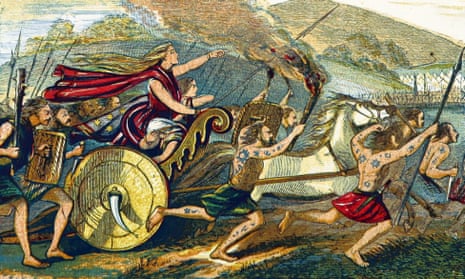At the Roar Women’s Festival in Colchester last month, a very special agony aunt was in attendance: Boudicca, Queen of the Iceni, leader of an uprising against the occupying Roman forces and legendary British heroine.
One attendee asked for advice on how to deal with cat-callers in the street. Boudicca was both practical and very on-brand: “You must get the attention from other people passing by, and if no one helps you… burn them all!”
Boudicca was actually Elizabeth Cleone Hopland, a Colchester-based actor and director who studied at the New York Film Academy. She had been brought on board by Colchester’s Eye of Boudicca women’s collective, and her costumed turn at the Roar Festival was so successful she was asked to reprise the role for a march through the town on International Women’s Day a few days later.
Colchester is a major part of the Boudicca story. The town, known in AD61 by its Roman name, Camulodunum, was destroyed by the rampaging Iceni as they fought – and ultimately failed – to defeat the occupiers.
But Boudicca is not just a local hero. In fact, she is enjoying something of a national resurgence at the moment as a symbol of rebellion, fighting against oppression, and a flag-bearer for women almost 2,000 years after she died.
“I’ve always admired Boudicca and her warrior qualities. I was fascinated with her history of being the Iceni Queen and that we only know of her tale from two male Roman writers,” says Hopland. “Her story has only ever been told for her. We must question that narrative. “She is most definitely relevant today. She is a beacon of strength for many. Women are still getting taken advantage of, we need women to feel safe in our communities and that they feel they are heard. Boudicca represents the power of the women scorned.”
There is also a new book about the life of Boudicca. Echolands is writer and archaeologist Duncan Mackay’s personal mission to get to the heart of the Boudicca legend that has fascinated him for a lifetime.
What we know about Boudicca mainly comes from the Roman historians Tacitus and Cassius Dio. We know she was married to Prasutagus, a king of the Iceni, and had two daughters, who were infamously raped by the Romans as punishment to Boudicca, who was flogged. Other than that – we don’t even know when she was born – her story is vague. And yet it endures.
Mackay says: “There is almost a mythological aspect to Boudicca, and she’s sometimes seen in the same way as King Arthur, but we know Boudicca was real, we just don’t know a huge amount about her.

“I always wanted to explore her story and for the book I went on a journey to find the traces of Boudicca’s world.”
Mackay’s journey takes him from his native Norfolk to Colchester, Anglesey and even the London Underground. And throughout it all, Boudicca’s echoes resonate.
“Boudicca is a perennial story. Each generation has their own take on her. She was a popular story during the Victorian times but quite problematic for them; she was fighting against the Roman Empire, which perhaps sat a bit uncomfortably during the days of the British Empire,” he says.
Towards the end of Queen Victoria’s reign the bronze statue of Boudicca and her daughters was erected on Victoria Embankment, in 1902. It became a symbol and rallying point for the Suffragette movement.
“Boudicca pointing towards Westminster was a really powerful symbol for women fighting for their rights,” says Mackay.
after newsletter promotion
“Boudicca continues to find new relevance in the modern day.”
Author TG Hambleton is currently writing a novel set in Boudicca’s ancient Britain, and her dog is named after the warrior queen.
“I was raised on a diet of pre-Roman Britain and the mud of archaeological digs. My mum dragged my sister and I to every stone circle, crumbling castle and hole in the ground across the British Isles as kids.
“Of the hundreds of text books my mum had, I’ve kept all the Boudicca and British tribes tomes with her fine hand-written notes scrawled in the margins,” she says.
“We’re definitely in what I call the Boudicca zeitgeist. Warrior queens are ingrained in the British hive mind. Their archetypes capture the imagination – stories of females triumphing over subjugation in a man’s world, ruling and fighting. It’s exciting. But more than that, provides hope.
“The story of Boudicca is relevant now. People seem to have a yearning interest in Britain before the Romans – perhaps the upheaval of Brexit, the pandemic, the meltdown of society on social media drives this. Suddenly tribal Britain is on trend like an ideal. Surely every woman can be Boudicca?”
And it’s not just books. Last month a new beer named Boudicca’s Chariot was launched by an all-female team of brewers and ale connoisseurs in Manchester.
“It’s always been Boudicca’s time,” insists Elizabeth Hopland. “Perhaps more people are educating themselves on the history and are paying homage to her tale. She is a timeless feminine icon.”
